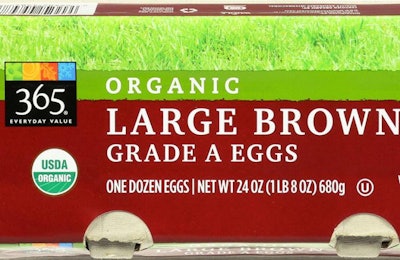
All 365 Everyday Value eggs sold in Whole Foods Market stores must now meet new standards of living for the hens in the supply chain.
Under the new requirements, announced on March 22, farms must adhere to the following living conditions for laying hens:
- Cage-Free Plus: Birds must live indoors with perches and shelters
- Outdoor Access: Birds have at least as much space outdoors as indoors
- Pasture-Raised: Birds have access to rangeland or grassland
- Mobile Houses on Pasture: Birds live outdoors with mobile houses for shelter
These four standards go beyond cage-free standards by providing requirements for the comfort, physical safety and health of the birds, the company stated in a press release. The new standards require perches for laying hens and prohibit the use of mammal or poultry byproducts in bird feed.
“We’ve been selling only cage-free eggs in our dairy department since 2004, and we decided it’s time to take our egg standards one step further,” said Joe Dickson, global quality standards coordinator at Whole Foods Market. “We’re proud to launch this new set of standards for all of our 365 Everyday Value eggs.”
The grocer also uses only cage-free eggs in all of its own kitchens, bakeries and bake houses. In 2016, Whole Foods Market certified that all 365 Everyday Value eggs sold in stores were from farms verified to only use Non-GMO feed.

















